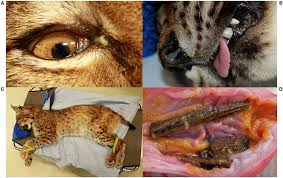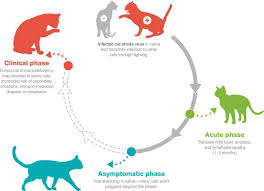Feline Immunodeficiency Virus (FIV) is a lentivirus that specifically targets cats, leading to a progressive weakening of the immune system. The virus is primarily spread through bite wounds, making outdoor cats and those involved in fights more susceptible.
Feline Immunodeficiency Virus (FIV) is a significant viral infection that affects cats worldwide. Similar to the human immunodeficiency virus (HIV), FIV compromises the immune system, making infected cats more susceptible to various infections and diseases. In this comprehensive guide, we will explore the nature of FIV, its transmission, clinical signs, treatment options, prevention strategies, and provide answers to frequently asked questions.
Clinical Signs of FIV:
Early Stage:
- Fever: Initial fever that may resolve without treatment.
- Lymphadenopathy: Swollen lymph nodes.
Latent Stage:
- Asymptomatic Period: Cats may appear healthy for years as the virus slowly weakens the immune system.
Final Stage:
- Secondary Infections: Increased susceptibility to bacterial, viral, fungal, and parasitic infections.
- Chronic Inflammatory Conditions: Conditions such as stomatitis, dermatitis, and upper respiratory infections.
- Weight Loss and Poor Coat Condition: Progressive weight loss and a deteriorating coat condition.

Transmission of FIV:
The primary mode of FIV transmission is through deep bite wounds. The virus is present in the saliva of infected cats and enters the bloodstream of another cat through these wounds. Other modes of transmission, such as from mother to kitten during birth or through mating, are less common.

Diagnosis of FIV:
- ELISA Test: Enzyme-linked immunosorbent assay to detect FIV antibodies.
- Western Blot Test: Confirmatory test following a positive ELISA result.
- PCR Test: Polymerase chain reaction test to detect viral DNA in the blood.
- For feline leukemia [Click Here].
Treatment of FIV:
Supportive Care:
- Management of Infections: Prompt treatment of secondary infections with antibiotics or antifungals.
- Good Nutrition: High-quality diet to support overall health and immune function.
- Regular Veterinary Check-ups: Frequent monitoring of health status and early detection of secondary infections.
Antiviral Therapy:
- Antiviral Drugs: Some success with drugs like AZT (zidovudine) has been reported, though this treatment is not widely adopted due to variable results and potential side effects.
Prevention Strategies:
Vaccination:
- FIV Vaccine: Available but not always recommended due to its variable efficacy and interference with future diagnostic testing.
Behavioral Management:
- Indoor Living: Keeping cats indoors to reduce the risk of fights and exposure to FIV-infected cats.
- Neutering: Reducing aggression and roaming behavior by neutering male cats.
Routine Health Care:
- Regular Vet Visits: Ensuring early detection and management of health issues.
- Good Hygiene: Maintaining a clean living environment to minimize the risk of infections.
- For more details about FIV [Click here].
Conclusion:
Feline Immunodeficiency Virus presents a significant health challenge for cats, but with proper understanding, diagnosis, and management, affected cats can still lead fulfilling lives. By following the guidelines outlined in this article and consulting with veterinarians, pet owners can effectively manage FIV and provide their feline companions with the best possible care. Remember, a well-informed owner is the best advocate for a healthy pet.
FAQs:
Q1: Can FIV be transmitted to humans or other animals?
A1: No, FIV is species-specific and cannot be transmitted to humans or animals other than cats.
Q2: How long can a cat live with FIV?
A2: Many cats with FIV can live normal, healthy lives for many years, especially with proper care and management.
Q3: Should FIV-positive cats be isolated from other cats?
A3: To prevent transmission, it is advisable to keep FIV-positive cats separated from FIV-negative cats, particularly if there is a risk of fighting.
Q4: Can FIV be cured?
A4: Currently, there is no cure for FIV, but with proper care, affected cats can lead comfortable lives.
Q5: Is FIV the same as feline leukemia virus (FeLV)?
A5: No, FIV and FeLV are different viruses, though they both compromise the immune system. FeLV is more easily transmitted and generally has a worse prognosis.

